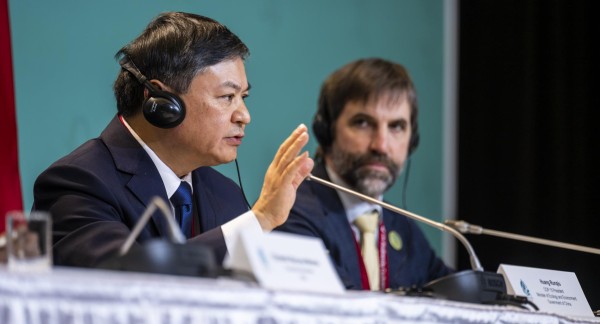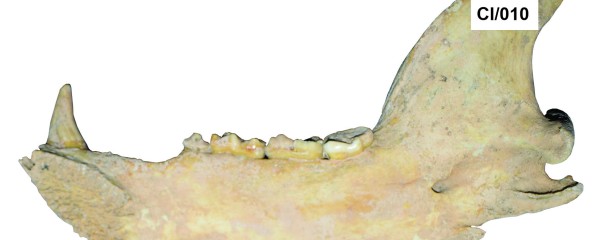A global framework to halt biodiversity loss and restore natural ecosystems

On 19 December 2022, the 15th Conference of Parties to the UN Convention on Biological Diversity (CBD COP 15) adopted the “Kunming-Montreal Global Biodiversity Framework” (GBF), including four goals and 23 targets for achievement by 2030. By doing so, the nations of the world agreed on a historic package of measures deemed critical to addressing the dangerous loss of biodiversity and restoring natural ecosystems. The ambitions include to protect 30% of Earth’s lands, oceans, coastal areas and inland waters, to reduce annual harmful government subsidies by $500 billion, and to cut food waste in half. The deadline for achieving these targets is set at 2030. Several teams of the Royal Belgian Institute of Natural Sciences were part of the Belgian delegation, attended the conference and were involved in the negotiations.
The science is clear: biodiversity is being lost at an alarming rate and this loss must be put to the credit of mankind. As many as one million species are threatened with extinction. The loss of the ecosystem services they provide us with poses a great risk to human health and our quality of life. The increasing use of space by a growing world population, the exploitation of biotic and abiotic resources, climate change, pollution and the introduction of invasive species outside their normal range are among the main threats to our biodiversity.
After having been delayed by Covid several times, and after having been moved from China (Kunming) to Canada, the so-called COP15 was finally hosted in Montreal from 7 to 19 December 2022, with China retaining the presidency. 188 governments were present on site, representing 95% of all 196 Parties to the UN Convention on Biological Diversity (CBD). They finalized and approved measures to arrest the ongoing loss of terrestrial and marine biodiversity and set humanity in the direction of a sustainable relationship with nature, with clear indicators to measure progress.
An Uncertain Run-up
In the current context of the pandemic, war, energy crisis and so on, the preparations have been slow and painful. Preparatory work resulted in a draft agreement of which much was in brackets, reflecting disagreement in the UN process as countries have added suggestions on how the final set of targets should look. This led to concerns that the biodiversity crisis would not get the attention it deserves from governments globally, or at least that there would be too little decisiveness and ambition in the outcomes of the meeting.
However, it seemed that the parties to the CBD have learnt from the failure of the rather vague Aichi Biodiversity Targets, set in Japan in 2010 for the previous decade. Ultimately COP15, the most important biodiversity conference in more than a decade, largely fulfilled expectations after all. At about 3.30 am local time on Monday 19 December, news broke that an agreement had been struck.
30 x 30 x 30

The result is a framework with ambitious and precise targets for concrete action and sufficient resources for their implementation, to be rolled out in a traceable and coordinated approach. The deal includes targets to protect 30% of the planet for nature by the end of the decade in 2030, reform $500 billion of environmentally damaging subsidies, and restore 30% of the planet’s degraded terrestrial, inland water, coastal and marine ecosystems.
Furthermore, the signatories agreed to halt human induced extinction of known threatened species and substantially increase (maintain, enhance and restore) the area of natural ecosystems by 2050, and to increase abundance of wild species to healthy and resilient levels. To ensure that the ecosystem functions and services will benefit both present and future generations, the countries commit to using and managing our environment and the species that live in it more sustainably and make attention to ecosystems and biodiversity an integral part of all policy processes and economic activities, well beyond protected areas.
They also agreed that the genetic diversity within populations of wild and domesticated species needs to be maintained, safeguarding their adaptive potential, and that the monetary and non-monetary benefits of using genetic resources and traditional knowledge need to be shared fairly and equitably (also taking into account indigenous peoples and local communities) is specifically recorded in the framework.
Achieving all this obviously requires a redirection of financial resources, both within and between countries. Unsurprisingly, money talk was the biggest obstacle until the final stage of the negotiations, with some of the least developed countries wishing for additional financial aid. But on this issue too, COP15 could end with a largely supported consensus.
A more detailed description of the four overarching global goals and the 23 targets of the Kunming-Montreal Global Biodiversity Framework can be consulted in the official COP15 press release of the CBD.
A Break with the Past?
Although the Montreal-Kunming agreement is not legally binding, governments will be tasked with showing their progress on meeting the targets with national biodiversity plans, akin to nationally determined contributions, which countries use to show progress on meeting the Paris climate agreement.
Dr. Hendrik Segers, coordinator of the Belgian National Focal Point to the Convention on Biological Diversity, concludes a particularly busy period with a good feeling: “Never before have governments met such concrete targets that were established internationally for the protection and restoration of biodiversity, and more generally, of nature. The Kunming-Montreal agreement should therefore be considered a historic step in moving away from the years when humanity failed to break with the continued destruction of ecosystems and the decline of biodiversity.”
RBINS at COP15
Several teams of the Royal Belgian Institute of Natural Sciences (RBINS) were actively involved in the preparations of the Belgian input for COP15, were part of the Belgian on-site delegation, and participated in the negotiations and the organization of side events.
National Focal Point to the Convention on Biological Diversity (NFP-CBD)
The general mission of the RBINS ‘To provide the scientific community, policy makers and society with good and relevant science and appropriate advice on nature and its sustainable management’ and the main objectives of the Convention on Biological Diversity ‘To conserve biodiversity, to enhance its sustainable use and to ensure an equitable sharing of benefits linked to the exploitation of genetic resources’ align perfectly on the sustainable use and management of biodiversity and ecosystems. It is therefore not surprising that the Belgian National Focal Point to the CBD is housed within the RBINS. Fostering collaboration amongst relevant stakeholders in biodiversity in Belgium is a core task of the NFP-CBD and preparing/coordinating input for CBD COPs is an essential part of the NFP mandate.
As the CBD also emphasizes the importance of the exchange of information and the cooperation between countries, for which an international network of partners was set up, called the Clearing-House Mechanism (CHM), the NFP-CBD is also very active in illustrating what Belgium is doing in the framework of the CBD and as such also in capacity building in other countries. Since COP13, awards have been presented to the Parties that have made the most significant progress in the establishment or further development of their national Clearing-House Mechanisms. At COP15, the CHM-Awards Ceremony has taken place on 18 December, and Belgium was awarded the Silver Award in the ‘New National CHM Category’ (ex-aequo with Burundi and Bhutan, while France was awarded the Gold Award).
Belgian Biodiversity Platform (BBPF)
The Belgian Biodiversity Platform is a national science-policy interface funded by the Belgian Science Policy (BELSPO). It is hosted by four organisations (BELSPO, RBINS, INBO and DEMNA) and offers access to primary biodiversity data and research information and encourages interdisciplinary cooperation among scientists and policy makers. It advises on the designation of biodiversity research priorities and promotes Belgian biodiversity research at international fora. The Belgian IPBES National Focal Point (Intergovernmental Science-Policy Platform on Biodiversity and Ecosystem Services) is also hosted by the BBPF. The activities of this National Focal Point include involving Belgian experts and stakeholders in the IPBES work programme and activities. The IPBES Global Assessment Report on Biodiversity and Ecosystem Services (2019), the most comprehensive ever synthesis of published information on the topic, was an important source of information and motivation for the discussions at COP15.
The BBPF, hosting the Belgian node of the Global Biodiversity Information Facility and coordinating Biodiversa+ on behalf of BELSPO, co-organized a COP15 side event with these two organisations focusing on building capacity to deliver open biodiversity data for research and decision making in support of the Global Biodiversity Framework. The BBPF also participated as speaker in the science forum, elaborating on the plans of Biodiversa+ to set up a European observation network, to help monitor and track progress within Europe towards the new targets. Furthermore, BBPF moderated the ‘Speaking up for Nature’ communication event of the International Union for the Conservation of Nature (IUCN) aiming at strengthening the communication between IUCN and the CBD. Together with the IPBES Chair, it also took care of the science policy forum debrief organized by the Post-2020 Global Biodiversity Framework EU Support.
Capacities for Biodiversity and Sustainable Development (CEBioS)
CEBioS is a programme financed by the Directorate-General for Development Cooperation (DGD) that is also housed at RBINS. It carries out capacity building for partners of the Belgian Development Cooperation in the field of biodiversity conservation and sustainable management linked to poverty eradication. As such, CEBioS works in the framework of international obligations of Belgium, including under the Convention on Biological Diversity. Its activities include institutional cooperation with partner organisations, calls for proposals for short grants, workshops, trainings, policy support, dedicated projects, public awareness and publications. CEBioS also provided the necessary funds for the on-site presence of several members of African delegations at COP15, all coming from partner countries of the Belgian Development Cooperation.
CEBioS and UNESCO organized a successful side-event at COP15, fitting into the efforts to mainstream biodiversity into the realm of development cooperation and the UN sustainable development goals. In the first part of the event, a sample of best practices and lessons learnt from 10 years of Capacity Development in Africa was presented, while the second part was devoted to the presentation of a new practical manual on ecosystem services assessment in African Biosphere reserves (the EVAMAB 3-year project).




